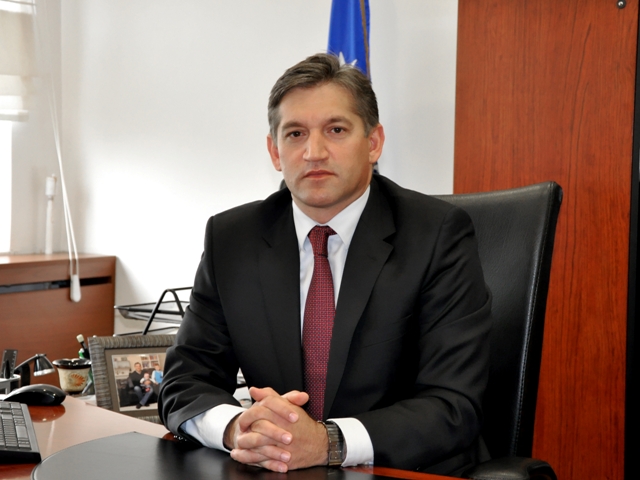Beqaj: Privatization of Publicly Owned Enterprises to continue pursuant to Assembly and Government decisions and in full transparency
Prishtina, 03 October 2012 – In conformity with the Constitution of the Republic and in harmony with the vision for sustainable economic development, the Government of Kosovo is determined to conduct structural economic reform, in order to functionalize its market economy, strengthen the private sector, establish high professional and institutional norms aimed at enhancing sustainable economic development and providing new employment possibilities. Sustainable development per se includes elements such as economic development, socio-economic cohesion and environmental protection, said the Minister of Economic Development, Besim Beqaj, during the session of the Assembly of Kosovo dedicated to the privatization process.
At this occasion, Minister Beqaj said that the process was conducted with full respect to legal provisions and principles of transparency. “The principles of transparency, competitiveness, equal treatment of all interested companies, open discussion with all local and international stakeholders, professional work, maximal valorization of natural and human resources, full protection of employees’ interests, long-term investments aimed at infrastructural improvements, elimination of state guarantees and subsidies for failures in collection, reduction of commercial and technical losses, represent some of the key principles adhered to by these transactions,” he said.
Beqaj said that the Government of Kosovo believes strongly in market economy. It remains determined to create a sound legislative basis, the necessary infrastructure for the country’s development, and adequate economic policies.
“All of the above are tasks of the Government of Kosovo, and tasks that the private sector can not perform; however, we remain convinced that the market economy philosophy, which yielded positively in most successful global economies, requires economic development, increased employment, enhancement of citizen welfare to be implemented by the private sector,” said the head of MED.
“In reference to a number of statements related to the private sector, Minister Beqaj said that the Government by no means considers the private sector to be detrimental to the state, or to be criminalized, as some stakeholders and pseudo-professionals tried to argue recently.”
“This sector employs 80% of Kosovo employees, and is a strong contributor to the state budget, which, in turn, provides for the salaries of teachers, policemen, soldiers, retirees; funds the establishment of new universities, construction of new schools, distribution of books free of charge for pupils of our Republic and at the same time funds all other infrastructural projects, which are making us a dignified country aspiring EU integrations.”
Beqaj said that we have be rational in presenting the post-war Kosovo economic reality, bearing in mind active observation of the country’s historic, politic and economic developments; hence, we are striving to ultimately clarify that privatization has not destroyed and is not destroying the country’s economy.
“Kosovo was economically destroyed by Serbian occupation and destruction, and by connecting Kosovo’s economy with Serbian economy; it can be destroyed again if wrong policies are pursued. In the 90s, when Kosovo was part of the unplanned Yugoslav economy, no social enterprise was ever managed on the basis of a given economic principle. All socially and publicly owned enterprises were for 10 complete years continuously stolen and destructed, with the process culminating in full destruction of their ancillary infrastructure during the war,” he added.
According to Beqaj, the private sector and privatization did not destroy the country’s economy. Destruction resulted from the suffocating, centralized approach and nationalization tendencies that will cause its sinking for generations to come.
“I am very convinced that all those people that do not support market economy, who call for a planned and centralized economy, who unfortunately hinder the entry of foreign investors to Kosovo, who misinform the public and conduct political campaigns, are in fact harming the country’s economic development, diminishing citizen welfare and endangering the future of our children; they are unfortunately on the wrong side politically and economically,” said the Minister.
Referring to various statements regarding the privatization of Trepça, Minister Beqaj said that he is not aware of where and which local institutions have discussed on this matter, furthermore, bearing in mind that UTUK has its own representative in the KPA Board, which is responsible for the management of “Trepça”.
At this occasion, Minister Beqaj illustrated developmental mistakes by taking the examples of Slovenia and East Germany. “Many professionals called upon the successful Slovenian example, where the state maintained its economic impact; I wish to remind you today, that Slovenia is the sixth EU country which may be requesting financial aid from the EU in order to avoid bankruptcy,” he said.
The Minister underlined that this stands witness that economic mistakes’ costs may be paid for by the current generations in the sense of deficiencies in development and by future generations. “Market economy is tough, requires reform and increased accountability, but it definitely has no alternative and this is what the Government of Kosovo believes in. The citizens of our Republic don’t have good memories of the socialist system or Yugoslavia, hence, I call upon all of you not to be part of the wrong side, professionally or politically, because future generations will not forgive us if we do,” said in his concluding remarks the Minister of Economic Development.
Finally, Minister Beqaj said that there are obstacles hindering this structural reform of our country’s economy and they don’t come only from inside the country.
“For your information, we have come to possess a letter by Aleksandar Vulin, who calls all parties to withdraw from privatization and expresses direct pretensions over Kosovo’s economy. I think that these issues have to be treated with special care,” said among other Beqaj.

